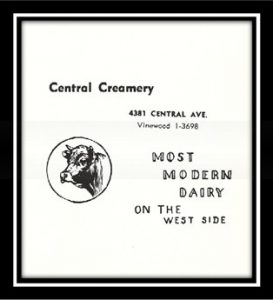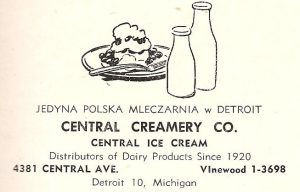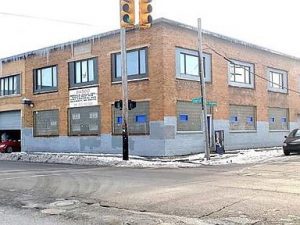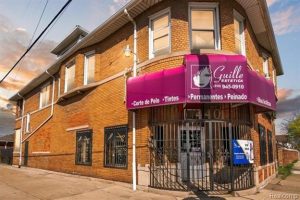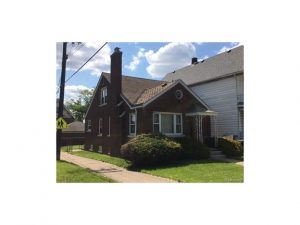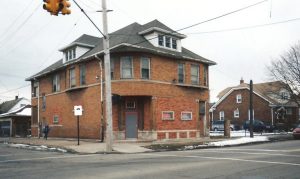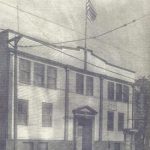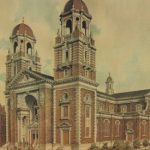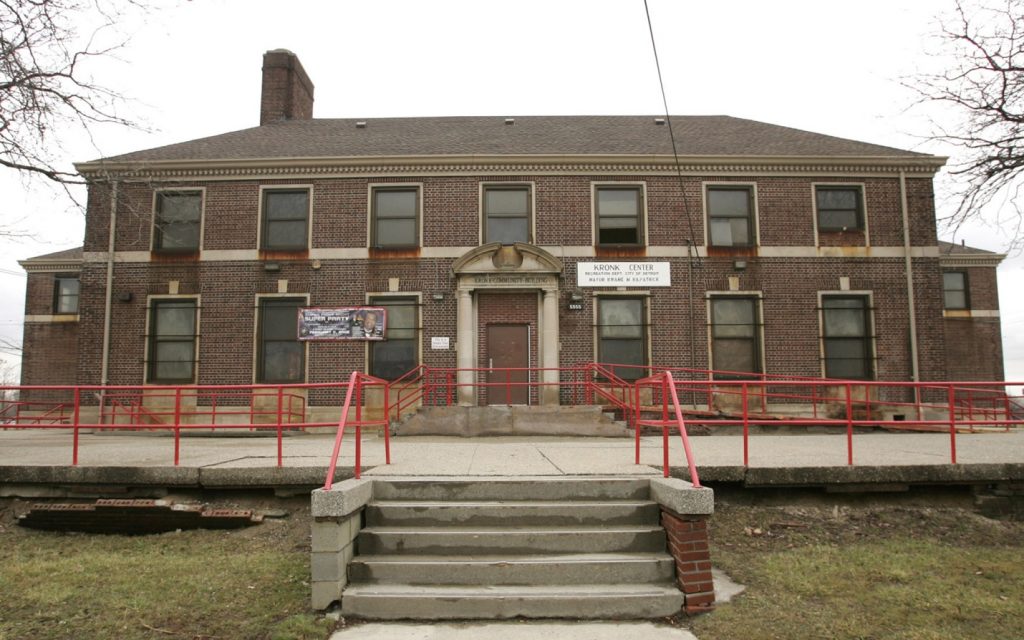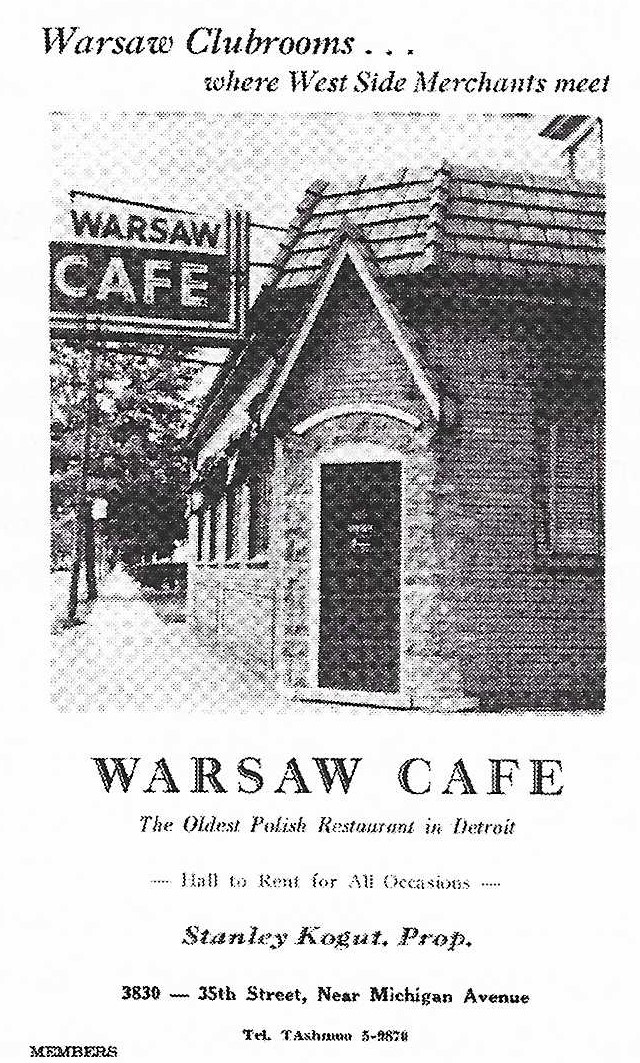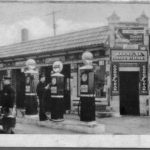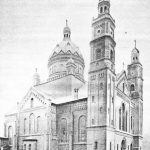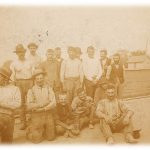A History of Central Creamery
4381 Central Avenue, Detroit 48210
Central Creamery was an extremely popular family-owned business in west side Detroit’s Polonia. It was founded in 1920 by the Zajdel family, who later spelled their name Zaydel. The creamery was located at 4381 Central Avenue, on the southwest corner of Central and St. Stephens. In the 1950s, their phone number was VI1-3698.
The creamery’s founders and owners were Walter (d. 1961) and Julia (nee Niezgoda) Zaydel. Walter and Julia were married on May 20, 1911. They had a daughter named Stella (March 5, 1912 – August 2, 2001) and a son named John (January 13, 1914 – October 29, 1966).
John married Stella Michno (April 4, 1917 – August 19, 2003), whose parents owned Michno’s Bar, and she, too, became Stella Zaydel. Stella Zaydel, Walter and Julia’s daughter, married Bernard Donakowski and became Stella Zaydel-Donakowski. (Bernard and Stella had a daughter, Delphine, known as Dolly, who would marry Walter Jablonski. The couple would later become members of the West Side Detroit Polish American Historical Society.)
All three families—Walter and Julia Zaydel, Bernard and Stella Donakowski, and John and Stella Michno—lived on 52nd Street in the St. Stephen neighborhood. Walter and Julia lived at 4405 52nd Street, a custom-built, four-bedroom, one and one-half bath bungalow on the corner of St. Stephens. The house featured hardwood floors throughout, a large living room with a natural fireplace, and a summer room.
Michno’s was situated on a double lot at 4401 Central, in a beautiful, large, light-bricked building on the northwest corner of Central and St. Stephens. Michno’s was an extremely popular hangout and was known as the St. Stephen’s bar, as it was the neighborhood bar closest to St. Stephen parish, which was—and still is—located on St. Stephens between 52nd Street, Central, and St. John Street.
The Michno’s building was constructed in the 1920 time frame, and like many properties of the era, it was built for both multi-family and multi-business use. The two-story building had hardwood floors, a basement, and an attic area. The first floor was where the bar was located. Residential living spaces were upstairs on the second level.
St. Stephen Catholic Church was founded by a small group of Poles who settled near the Clippert Brickyards and who were determined to preserve the traditions of their forefathers. A Catholic education for their children in their Polish language was of primary importance to them. The Felician Sisters arrived to teach the students at St. Stephen School.
Before the church was constructed, Mass was offered in the Wyderko Bakery, which was located on the corner of Central and St. John. The first Mass was celebrated in the new church on Easter Sunday of 1917.
As of 2022, Michno’s Bar is closed. The building has been renovated, and a beauty salon occupies the premises. St. Stephen parish is known as St. Stephen/Mary, Mother of the Church and has a predominantly Hispanic congregation, but there are still many Polish people in the neighborhood who have roots in the parish and who continue to support the church.
Stanek Candy Store was also located in the vicinity, near Michno’s Bar. The building that housed the candy store is still standing.
The Zaydels were members of St. Stephen parish, and they were very active in the church. They were involved in such societies as the Sacred Heart Society, the Altar Society, and the Holy Name Society. They always contributed generously to the parish.
The Zaydels were connected to many other families within the St. Stephen parish neighborhood. Julia Zaydel had a sister whose son was Edward F. (“Pete”) Niezgoda (January 14, 1919 – June 28, 2008), a lifelong resident of the St. Stephen neighborhood and an Honorary Member of the West Side Detroit Polish American Historical Society. Along with the Niezgoda family, there were a number of other families in the neighborhood that were closely aligned with the creamery, including the Depowski, Bador, Rozycki, Wyderko, and Gorczyca families. The Wyderko family also owned and operated the Wyderko Bakery.
A creamery is essentially a plant that processes milk and cream and where butter and cheese are produced. In the 1950s, Central Creamery was known as “the most modern dairy on the west side.” In fact, it advertised as the only Polish dairy in Detroit. It was located in a two-story blonde brick building that stretched along several storefronts. There was a roll-up garage door for the delivery trucks to enter and exit.
The building was spacious, at 18,000 square feet and 120 feet long by 100 feet deep. Inside the building on the main level, milk and ice cream were processed on one end. Butter may also have been produced there. A fleet of delivery trucks was also housed in a separate area on that end of the building. A soda fountain was located on the other end of the main floor in a little ice cream parlor. There was a separate entrance to the ice cream parlor, and there were swivel stools along the soda fountain where customers could sit. Staff was hired from the surrounding neighborhood to work at the soda fountain, and the workers were all women or young high school girls. At the soda fountain, milkshakes, ice cream cones, and hot fudge sundaes were served.
Office staff worked on the second level of the building above the ice cream parlor. The second floor consisted of 6,000 feet, which was accessed by an elevator.
Central Creamery made home deliveries, and back then houses were built with milk chutes specifically for that purpose. Milk was sold in glass bottles, as production of plastic or wax cartons had not yet begun. The creamery truck stopped in front of the houses along the driver’s route, and the driver carried the milk in a wire metal crate and delivered it to each house’s milk chute.
The area of the building where ice cream was sold was also open to customers, who could walk in and purchase milk. During the 1940s, a small bottle of milk cost three cents, and if the bottle was returned, a rebate was given. At that time, the average cost of a gallon of milk was 63 cents.
For many decades, Central Creamery was the main outlet in the neighborhood for customers wishing to purchase dairy products. Milk and ice cream were their primary products. For years, it was the only place on Detroit’s west side that specialized in those products. Most people didn’t have cars in which to make a journey to Sanders, which was located on Michigan Avenue and Schaefer in Dearborn. However, after the creamery closed, people in the St. Stephen neighborhood did begin to travel to Dearborn and became Sanders customers.
Walter and Julia owned and operated Central Creamery for 35 years. They retired in 1955.
In 1956, the Central Creamery building was listed for sale. The asking price was $20,000.
On May 20, 1961, Walter and Julia Zaydel celebrated their golden wedding anniversary with a Mass and reception at St. Stephen Church. At that time, their family had grown to include nine grandchildren and six great-grandchildren.
As of 2022, the former Central Creamery building appears to be occupied by the Central Bizaar, an outlet that sells appliances, furniture, household items, closeout items, lighting, and tools.
In the early twentieth century, besides the creamery, some of the other principal industries in the area were Federal Screw Works at 3401 Martin Street, Kelsey-Hayes at 3600 Military Street (according to the Detroit Historical Society) and on McGraw near Livernois (according to other sources), Hammond Coal at 3050 Hammond Street, Military Coal at 2360 Military Street, and Goebel Beer, which was located on 52nd Street.
Central Creamery was a mainstay in Detroit’s west side St. Stephen neighborhood. For 35 years, the business made a positive impact on the people of the area. The founders belonged to a tight-knit group of families that generously supported St. Stephen parish and contributed immensely to their community, helping it to flourish throughout several decades. Today, many people who lived in the neighborhood and those who still live there have fond memories of the creamery, its soda fountain, and special times shared there among friends and neighbors.
As we look back on how life was in those times, perhaps many of us today wonder what it was like to experience the convenience of having milk delivered in glass bottles by a uniformed delivery man who placed it in a little chute on the side of the house, eliminating the necessity of having to make an extra trip to the store. We marvel at the simplicity of such gathering places as neighborhood soda fountains. In our fast-paced world, many aspects of life 75 or 80 years ago seem refreshing. What many of us undoubtedly long for most is the communal aspect of life, which naturally existed in our close-knit Polish neighborhoods of old.
Sources:
- “CENTRAL. 4381 (formerly Central Creamery).” For Sale ad. In The Detroit News: April 29, 1956, p. 122. Courtesy of Carla Reczek, the Detroit Public Library, Burton Historical Collection. Detroit News (online), 29 Apr 1956
- Czapski, Adele and Richard. Informal discussion with the author. Utica, MI: December 4, 2011.
- “Golden Jubilee of St. Stephen’s Parish – Detroit, Michigan – Oct. 12, 1967”
- https://commercial.century21.com/property/4401-central-street-detroit-mi-48210-REN02047
- https://en.wikipedia.org/wiki/Creamery
- https://wwii.detroithistorical.org/locations/kelsey-hayes-wheel-co
- https://www.detroityes.com/mb/showthread.php?11624-Kelsey-Hayes-Wheel-Company
- https://www.redfin.com/MI/Detroit/4405-52nd-St-48210/home/98392507
- https://www.tasteofhome.com/collection/this-is-what-groceries-cost-the-year-you-were-born/
- https://www.zillow.com/homedetails/4381-Central-St-Detroit-MI-48210/2081595054_zpid/
- Jablonski, Delphine (“Dolly”). Email to the author. West Bloomfield, MI: December 22, 2011.
- “Married 50 years ago today.” Article. In The Detroit News: May 20, 1961, p. 17. Courtesy of Carla Reczek, the Detroit Public Library, Burton Historical Collection. Detroit News (online), 20 May 1961 17
- Pociasek, Mary. Informal telephone discussion with the author. West Bloomfield, MI: September 28, 2022.
- Rozycki, Stella. Informal telephone discussions with the author. West Bloomfield, MI: November 21, 2011, and November 25, 2011.
- “RUBINOWY JUBILEUSZ PAMIĘTNIK – 40-lecia Grupy 170-ej Związku – Polek w Ameryce – W NIEDZIELĘ 5-go PAŹDZIERNIKA, 1952 – DETROIT, MICHIGAN” – RUBY JUBILEE – ZWIĄZEK POLEK W AMERYCE” (40th Anniversary – Group 170 Polish Women’s Alliance of America – Sunday, October 5, 1952 – Program)
- Soviak, Manya Abick. Interview with the author. Detroit, MI: August 1, 2007.
- St. Andrew Saltire Yearbook, 1955.
Photos and Images:
- Central Creamery ad from St. Andrew Saltire Yearbook, 1955, p. 103. Courtesy of WSDPAHS member Lorraine Kasper
- Central Creamery ad from “RUBINOWY JUBILEUSZ PAMIĘTNIK – 40-lecia Grupy 170-ej Związku – Polek w Ameryce – W NIEDZIELĘ 5-go PAŹDZIERNIKA, 1952 – DETROIT, MICHIGAN” – RUBY JUBILEE – ZWIĄZEK POLEK W AMERYCE” (40th Anniversary – Group 170 Polish Women’s Alliance of America – Sunday, October 5, 1952 – Program) (WSDPAHS archives)
- 4381 Central Avenue in Detroit, former home of Central Creamery, ca. 2022. Source: https://www.zillow.com/homedetails/4381-Central-St-Detroit-MI-48210/2081595054_zpid/
- Former home of Walter and Julia Zaydel at 4405 52nd Street in Detroit, 2022. Source: https://www.redfin.com/MI/Detroit/4405-52nd-St-48210/home/98392507
- 4401 Central Avenue in Detroit, former location of Michno’s Bar, 2022. Source: https://commercial.century21.com/property/4401-central-street-detroit-mi-48210-REN020475408
- Michno’s Bar exterior, December 5, 2012. Photo by Laurie A. Gomulka
